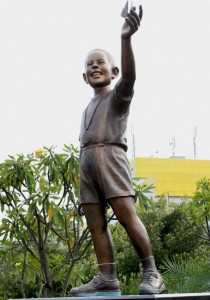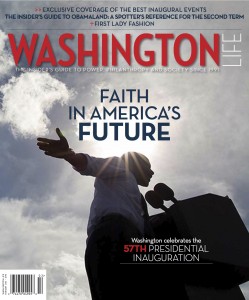But do they still love him the second time around?
By Roland Flamini
This article appears in the February 2013 issue.

President Barack Obama tours the Sphinx and pyramids outside Cairo on June 4, 2009. Background right is White House Press Secretary Robert Gibbs. (AP Photo/Gerald Herbert)
At Jakarta’s Menteng 01 Elementary School jubilant students marched from one classroom to another chanting “Obama wins again.” Then they circled round the statue of Barry (as he was known then) on the school grounds, and cheered the school’s most famous alumnus, as did Indonesians from all walks of life.
One Jakarta newspaper, reporting the news of his re-election, called him “The Menteng Kid.” Menteng was the Jakarta neighborhood where the president spent four years of his youth.
No fading enthusiasm there. Elsewhere in the world Barack Obama no longer retains the adulation he did four years ago, but he hasn’t lost all of his luster either.
“In his first election Obama enjoyed miracle status, now he is seen as definitely the president of the United States, respected and admired by Italians, and regarded as a realist who has done a good job of resolving the U.S. economic crisis,” says Massimo Franco, the political commentator of the Milan paper Corriere della Sera. “They wish he would help them resolve theirs.” Or, as one Western diplomat in Washington put it: “Over the past four years it became clear that Obama didn’t walk on water. But nobody could have lived up to people’s expectations, and he still commands enormous respect.”

The statue of “Barry” Obama erected in the village of Menteng, Indonesia, where the President attended school as a child. (AP Photo)
If Obama’s 2012 win wasn’t inspirational in the way his 2008 one was, declared Britain’s Guardian newspaper, “it was, arguably, a greater political achievement, good for Americans, good for America, and good for the world.” The inauguration, as the French newspaper Le Monde stated recently, was a “grande fête” but has “nothing in common with the historic celebration that drew two million people to the Mall in 2009. [This year’s] festivities have been planned at a more modest level.”
The same sentiment is repeated elsewhere in the West. Obama’s German admirers were disappointed when he failed to deliver what they thought would be a dramatic change in U.S. foreign policy, says Olivia Schoeller, one-time Washington correspondent of the Berliner Zeitung, but then his 2013 inauguration address won them back. “His speech touched themes the Germans love — environment, gun control, gay rights.” This was the old Obama they had cheered like a rock star at Berlin’s gold-tipped Victory Column in 2008. “They had been disillusioned when he didn’t close Guantanamo, and the use of drones is very unpopular here,” says Schoeller, who is now based in Berlin. “It was a side of Obama they hadn’t seen before; they began to think he was not the total opposite of [George W.] Bush. But then came the election, and it was Obama all over again.”
The president’s words from the inaugural podium, incidentally, played less well in the Vatican, which has long had issues with him over gay marriage, and — above all — abortion. “Obama’s relations with the Vatican remain patchy,” says Massimo Franco, the author of several books on the Vatican. “But the way Obama has prevailed among American Catholics in 2012, despite the opposition of the U.S. bishops, poses a problem for Vatican prelates in assessing their American policy.”
Russians watched the inauguration in droves, but given the current chill in bi-lateral relations, official Russia rained on Obama’s parade. The government-controlled paper Pravda, in its English edition, called the inauguration ceremony “a bit of a sham,” not least because, it claimed, Obama had in effect hijacked Martin Luther King Jr.
’s words, distorting the sentiment of the historic black leaders’ speeches. “The man who swore on Martin Luther King’s bible,” Pravda said, “is reported as personally deciding weekly who will be dismembered-by-drone. Under the Nobel Peace Laureate, the scale of human carnage is astounding, shaming, and chilling.”
The Chinese regime’s main paper, The People’s Daily, gave the inauguration short shrift, its brief article noting that the swearing-in drew a smaller crowd than in 2009, and blaming the decrease on what it called Obama’s record of broken pledges. But in China’s huge blog community it was another story. Sini Weibo, a massive blogging site, registered 25 million posts on January 21.
One blogger’s comment was forwarded over 2,000 times, picking up over 500 comments. Some found it worth noting that, in a secular country, the president was sworn in with his hand on a Bible, not the Constitution, and standing before a judge, not Congress.
The mess in the Arab world cries out for decisive leadership — if only anyone could decide what that leadership should do!
Obama’s famous “new beginning” speech in Cairo, with its recognition of Islam as an important world culture, and of Arab contributions to civilization, seems mostly remembered as a failed promise. A Time Inc. poll in April 2012 showed that the president’s popularity level among Egyptians had dropped to 19 percent from 24 percent. Still, Arabs generally wanted Obama to win.
A more belligerent George Romney reminded them of George W. Bush — widely seen as staunchly pro-Israeli — and was perceived as more likely to start a war. “Obama isn’t good,” tweeted one of Saudi Arabia’s senior clerics, Salman Al-Oudah, “but he is the lesser evil.” An editorial in El-Gomhuriah, the pro-government paper in Egypt reminded the re-elected president that he had “promised relations based on cooperation, justice and equality” so as to “erase the years of hatred and distrust characteristic of the George W. Bush years” and implied that it hadn’t happened yet.

Check out our February 2013 issue for exclusive coverage of the best inaugural events, First Lady fashion and, of course, an insider’s guide to power, philanthropy and society.
Obama’s sideline posture on developments in the tumultuous Arab Spring from Tunisia to Syria may be — as some commentators maintain — a measure of the new limits of U.S. power to shape events in the Middle East, or anywhere else, for that matter. And it is those limits that resign Palestinians to expecting — barring a miracle — little progress in the Middle East Peace Process in the foreseeable future. A leader, of course, can’t please all the people all of the time. But you would have thought that Obama’s alienation in the Arab world would be balanced by cordiality with Israel.
Not a bit. Obama’s tense relations with newly re-elected Prime Minister Benjamin Netanyahu are well known, and according to most observers the Israeli leader had done little to conceal his preference for a Romney victory. Hence this widely quoted sharp admonition, by way of congratulating the newly elected Obama, from Danny Danon, a rising star in Netanyahu’s Likud party: “Rather than dictating ill-advised policies that endanger the well being of America’s only true ally in the Middle East,” Danon declared, “now is the time for President Obama to return to the wise and time-honored policy of ‘zero daylight’ between our respective nations.”
Whatever happened to pleasing some of the people some of the time?
